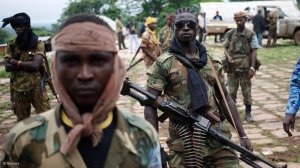The long-awaited first trial of a court established to prosecute war crimes in the Central African Republic’s drawn-out conflict has been postponed for the second time.
“The lawyers for the defence and those for the civil parties have asked the court for a postponement because they feel that they are not ready,” Paul Yakola, a lawyer for one of the defendants, told the Africanews outlet on Monday.
Prosecutor Alain Wabibikaye said he believed it to be a delaying tactic.
“We have followed this entire procedure with them from start to finish for three years and they had access to this procedure at all times, so it is not today that they can ask for a postponement to allow them to organise themselves,” Wabibikaye said.
Francine Evodine Ndémadé, coordinator of the victims’ association, said each postponement was “devastating for the victims”. “We don’t understand anything any more and we are obliged to wait,” Ndémadé told the news media.
The inaugural hearing was postponed on April 19 when lawyers for the defendants boycotted the proceedings.
The trial is related to the massacre of 46 civilians in the northern villages of Koundjili and Lemouna in May 2019, which prosecutors say was carried out by the Return, Reclamation, Rehabilitation (3R) armed group, one of the most powerful rebel movements in the country.
Three members of the group have been charged with war crimes and crimes against humanity. Joseph Bindoumi, president of the Central African League for Human Rights, told Reuters the defendants’ lawyers failed to show up for the inaugural hearing because of a dispute about the treatment of the defenders.
The Special Criminal Court was set up in 2015 to try crimes committed in wartime.
It is seen as a milestone for CAR where a decade-long conflict between government forces and rebels has led to the deaths of hundreds and forced more than one million people to flee.
Mass atrocities have led to interventions from United Nations peacekeepers and troops from Russia, France and Rwanda.
But rights groups have said crimes against civilians are common, often undocumented, and carried out with impunity.
CAR, rich in gold and diamonds, has been rocked by violence since 2013 when mainly Muslim Selaka rebels deposed then-President Francois Bozize, prompting reprisals from mostly Christian militias.
EMAIL THIS ARTICLE SAVE THIS ARTICLE
To subscribe email subscriptions@creamermedia.co.za or click here
To advertise email advertising@creamermedia.co.za or click here











